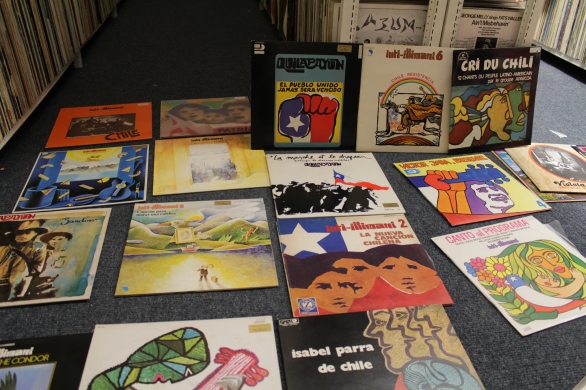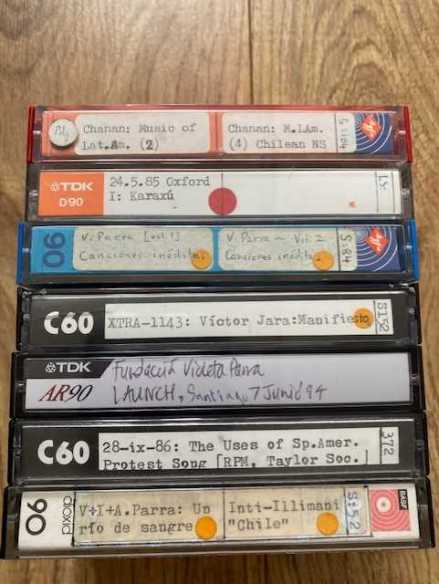
Richard Smith
Some readers may be familiar with BBC Radio 4’s feature Inheritance Tracks, in which the great and the good talk about music they have inherited, and music they cherish. For example, Liverpool-born Alexei Sayle talked about a Bertolt Brecht song that reminded him of his autodidactic parents and their involvement in the city’s left-wing Unity Theatre, and Elvis Costello’s Shipbuilding as a supremely political song. This approach is being used by a cross-disciplinary project at the University of Liverpool that aims to explore the power of musical reminiscences to promote well-being.
Within the archive of the University of Liverpool’s ground-breaking Institute of Popular Music (IPM) is the Robert Pring-Mill Collection of twentieth century Latin American political music. Pring-Mill was a Fellow of St Catherine’s College, Oxford, where he taught and studied Spanish and Latin American literature. He first went to Chile in 1948, where he encountered the poetry of (banned Communist) future Nobel laureate Pablo Neruda. This sparked a life-long interest in politically committed songs and poems, and his substantial collection of sound recordings, posters, albums and ephemera related to music of hope and struggle in Latin America was donated to the IPM. This unique resource inspired the Chile in/en Liverpool project.
The original, pre-pandemic idea was to introduce recordings and objects from the Pring-Mill Collection to small groups of Chilean exiles living in Liverpool, many of whom escaped the Pinochet dictatorship between 1973 and 1990, to prompt interaction and discussion. The aim was to encourage former exiles and their families and friends to share music-related reminiscences and explore aspects of memory and well-being. Lisa Shaw of the Department of Languages, Cultures and Film has led a project in Brazil and the UK on the power of cinema and film music to improve the emotional health of older people and those living with dementia through reminiscing. She joined forces with Sara Cohen, Director of the IPM, and Jacky Waldock, who is a researcher on sound and place-making, to win a grant from the Northern Network for Medical Humanities Research to develop the Chile in/en Liverpool project. The onset of the pandemic inevitably caused a rethink, and the team built a bilingual Facebook page to publicise the initiative and to engage potential participants. This is now being extended to include an Instagram platform and a podcast series – details will be posted on the Facebook page. As we slowly emerge from the restrictions, the project is returning towards its original goals in the guise of a series ‘Inheritance Tracks’ interviews.

The project is not only cross-disciplinary within the university, but it also involves the Chilean community in Liverpool, including poet and musician Francisco Carrasco, who came to the UK with his family aged eleven, and students: undergraduates, and postgraduate researchers such as me. My doctoral research, which was funded by the NWSSDTP, is on school and university students who opposed the Pinochet regime in Chile during the 1970s and 1980s. The importance of music to the anti-dictatorship movement, and to on-going campaigns for political and economic reforms in Chile, became very apparent during my fieldwork, and musicians such as Víctor Jara, Quilapayún, Inti-Illimani, Los Prisioneros and Violeta Parra, among others, are well represented in the Pring-Mill Collection. For me, this project is a fascinating opportunity to explore its relevance to some of the people who were forced to leave the country during the dictatorship years.
Reposted from North West Social Science Doctoral Training Partnership
Written by Richard Smith, Language Based Area Studies, University of Liverpool